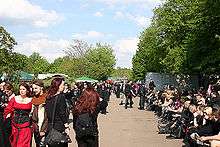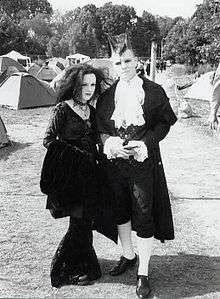Wave-Gotik-Treffen
| Wave-Gotik-Treffen | |
|---|---|
 WGT in Leipzig | |
| Genre | Gothic rock, EBM, Industrial, Noise, Darkwave, Neofolk, Neo-Classical, Medieval music, Experimental, Gothic metal, Deathrock and Punk music, Symphonic metal |
| Dates | 4 days on Whitsuntide |
| Location(s) | Leipzig, Germany |
| Years active | 1991– present |
| Attendance | 18,000 |
| Website | |
| Official Website Wave-Gotik-Treffen Leipzig | |
Wave-Gotik-Treffen (ger. das Treffen means "the meeting") is an annual world festival for "dark" music and arts in Leipzig, Germany. 150+ bands and artists from various backgrounds (Gothic rock, EBM, Industrial, Noise, Darkwave, Neofolk, Neo-Classical, Medieval music, Experimental, Gothic metal, Deathrock and Punk music being examples) play at several venues throughout the city over 4 days on Whitsuntide. The festival also features several fairs with medieval, gothic and cultural merchandise.
With 18,000[1] to 20,000[2] regular attendants, the WGT is one of the largest events of the Goth-, Cybergoth-, Steampunk and Rivethead- subcultures worldwide.
History
A first attempt at a Treffen was made in 1987 in Potsdam. However, as the laws of the German Democratic Republic made this kind of event illegal,[3] only a few hundred visitors attended.
In 1991, after the re-unification of Germany, the first official Wave-Gotik-Treffen was held in the Eiskeller club in Leipzig. Since then, the number of visitors has increased greatly.
The largest installment of the WGT was the one in the year 2000 with over 300 acts and an estimated 25,000 visitors.[4] However, that year's festival suffered financial collapse on the third day and had to be aborted. After all festival security guards, most bands and much of the technical staff had left, volunteer helpers and several bands who played for free staged a final concert. Contrary to police expectations, no rioting of any sort occurred.

Events

The major attraction of the Wave-Gotik Treffen is the band performances. Generally, the number of musical acts is close to 200, spanning the breadth of "dark music" from acoustic folk to medieval-influenced to deathrock, to dark electro, EBM, Symphonic Metal, Gothic Metal, industrial. The dozen-or-more venues are equally varied, from the stately Schauspielhaus to the somber Krypta of the Völkerschlachtdenkmal to the Parkbühne under the trees to the massive 10,000-person capacity AGRA fairground halls.

In addition, there are Renaissance fairs, Viking and Pagan markets, Gothic Romance events, CD/DVD and film premieres, literary readings, artist signing events, brunches celebrating absinthe, fetishistic events, and many late-night danceclubs such as Darkflower[5] or Moritzbastei with top-name DJs. The main market in the AGRA that runs the entire duration of the festival is perhaps the largest for the goth community anywhere in the world.
Festival participants typically stay either in designated camping areas outside the Agra venue or in the hotels and hostels in and around Leipzig. In order to stay at camping areas, participants must pay extra for an Obsorgekarte, which gives them access to the camping areas. All participants with a wrist band are entitled to ride local Leipzig public transportation, such as bus, tram and local train for free.[6]
The date of the WGT varies from year to year. It is held on the German holiday weekend of Pfingsten, known in English as Pentecost or Whitsun, which is 7 weeks after Easter (see List of Pentecost dates, 2002-2020). Unofficial events start in Leipzig on the Thursday night preceding the date of Pfingsten, while the official festival starts on Friday and runs until early-morning on Tuesday, as Monday is an official holiday in Germany.
Further reading
- Black celebration. 20 years Wave-Gotik-Treffen, Alexander Nym, Jennifer Hoffert (ed.), 2010, ISBN 3-86211-037-0.
See also
References
- ↑ Rutkowski, Roman (2004). Das Charisma des Grabes (The Charisma of the Grave) (in German). p. 61. ISBN 3-8334-1351-4.
- ↑ "Subkultur! — Gothic". Spontis (in German). 2008.
- ↑ "Wave Gotik Treffen 2008". Terrorverlag. Alternative Music Webzine (in German).
In the former GDR, devotees of Dark Wave music were given quite a run for their money. ... many events were prohibited and dissolved (In der ehemaligen DDR wurde es den Anhängern der Dark-Wave-Musik nicht gerade leicht gemacht. ... viele Veranstaltungen wurden verboten oder aufgelöst).
- ↑ Lorenz, Kay (16 July 2000). "9. Wave Gotik Treffen Leipzig 09.-11.06.2000". German Rock News (in German).
- ↑ http://www.darkflower.de
- ↑ http://www.wave-gotik-treffen.de/english/info.php
External links
| Wikimedia Commons has media related to Wave-Gotik-Treffen. |
Coordinates: 51°20′25″N 12°22′29″E / 51.3403°N 12.3747°E